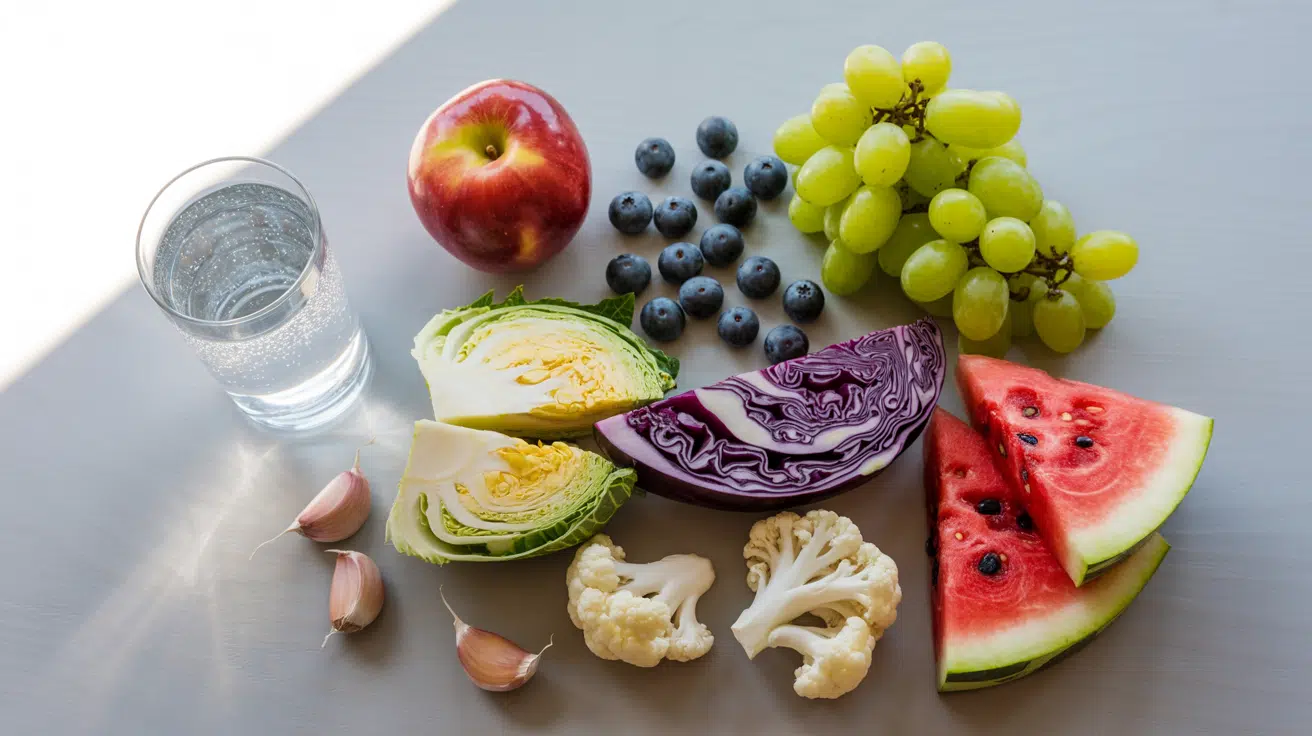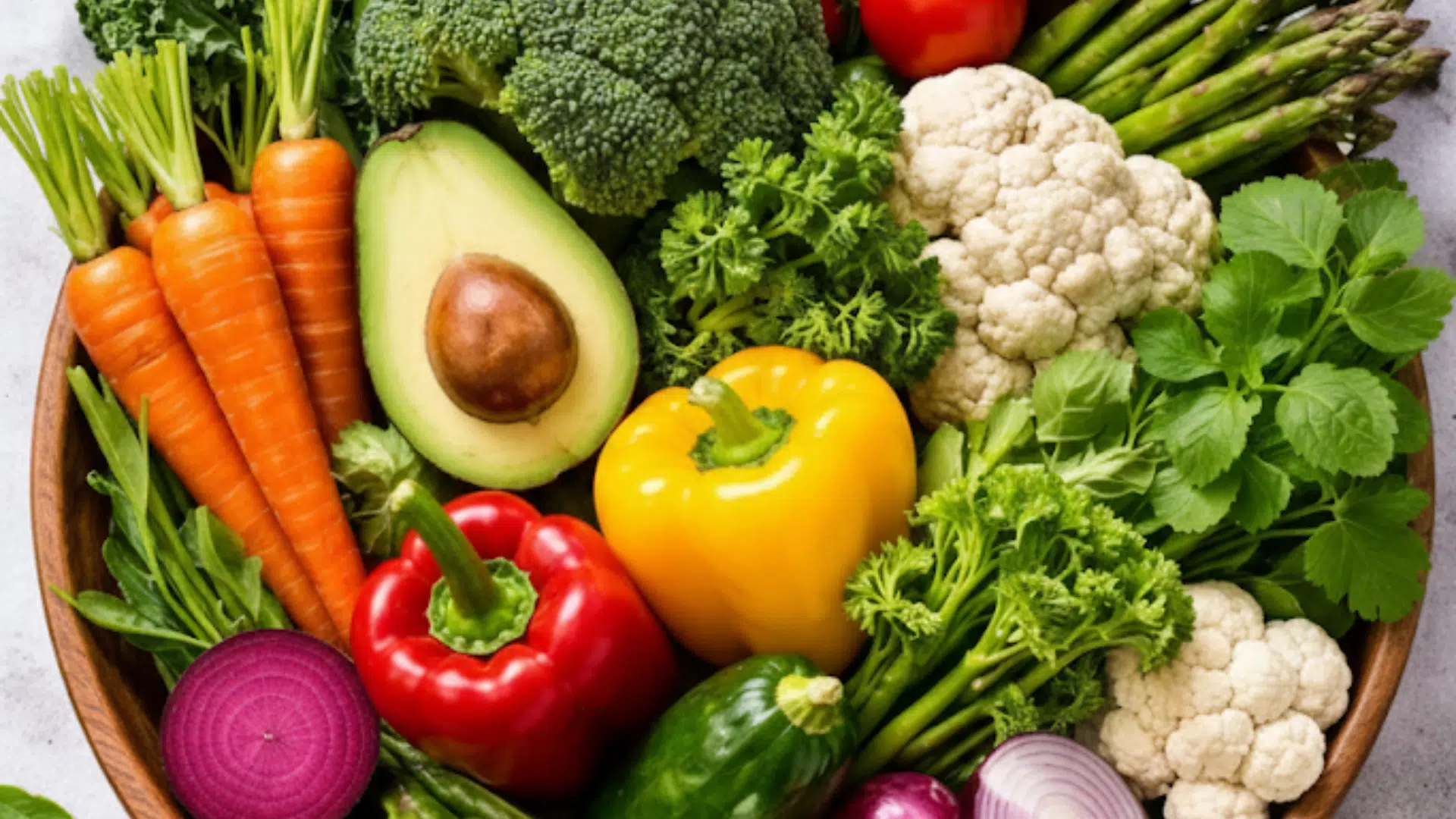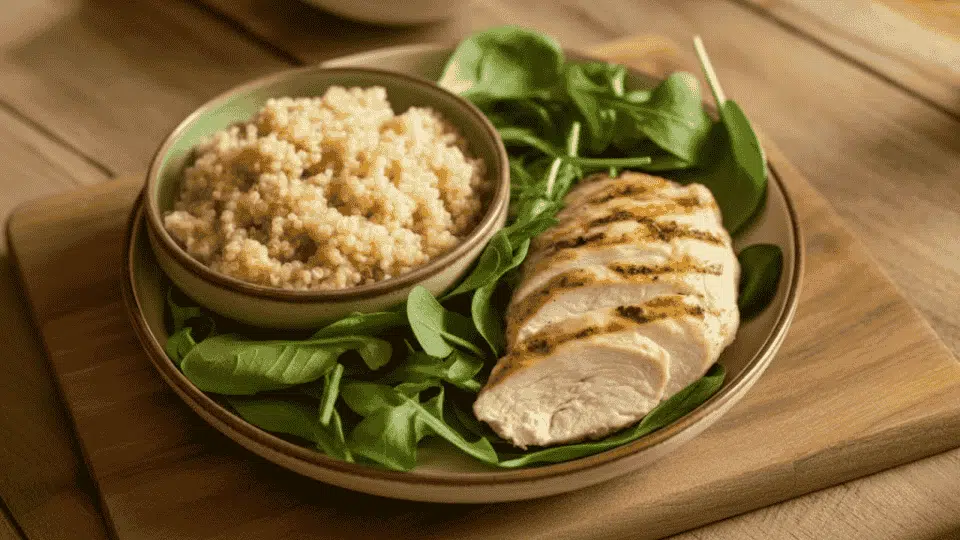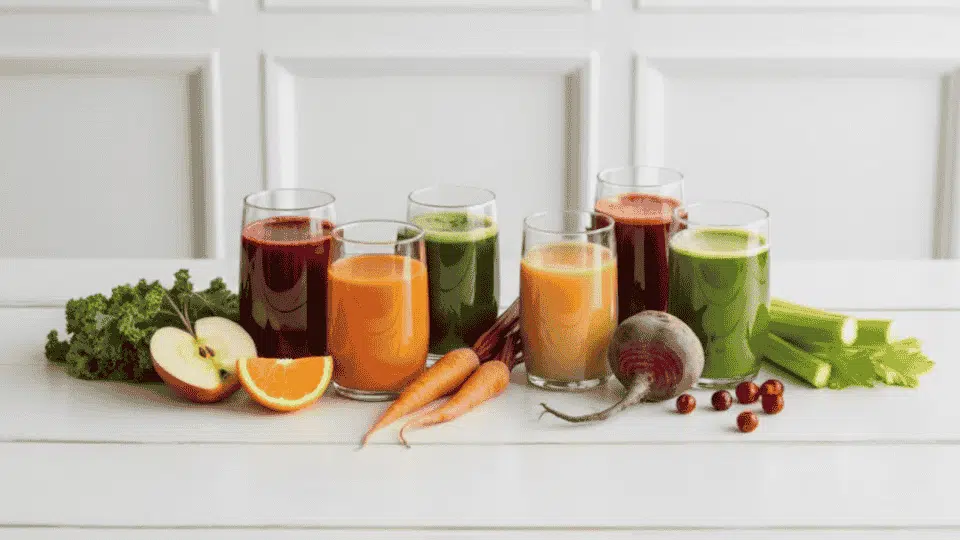Have you ever looked at your blood test results and wondered what creatinine means? It’s a small number, but it can tell a lot about how your kidneys are doing.
If your levels are higher than they should be, you’re probably looking for simple ways to support your kidney health. One thing that might help? Certain fruits.
In this post, I’ll walk you through a list of fruits to reduce creatinine levels and what makes them helpful. These are everyday foods that can be easily added to your routine.
You’ll also find tips on how to use them safely, especially if your doctor has mentioned kidney concerns.
What is Creatinine and Why Does It Matter?
Creatinine is a waste product that your muscles create when they use energy. Your kidneys filter this waste from your blood and remove it through urine.
Doctors measure creatinine levels through a simple blood test. They also calculate your glomerular filtration rate (GFR), which shows how well your kidneys filter waste.
Normal creatinine levels typically range from 0.6 to 1.2 mg/dL for adults. Higher levels may indicate that your kidneys are not filtering waste as effectively as they should.
When kidneys struggle to remove creatinine, it builds up in your blood. This buildup can signal kidney damage or reduced kidney function.
Can Fruits Help Lower Creatinine?
Fruits cannot directly lower creatinine levels, but they can support kidney health in important ways.
Many fruits contain antioxidants that help protect kidney tissue, and the fibre in fruits supports digestion, which may reduce strain on the kidneys.
Fruits with high water content support hydration, which helps the kidneys remove waste more efficiently.
The key is to choose kidney-friendly fruits and combine them with other healthy habits and proper medical care.
Best Fruits to Support Kidney Health and Lower Creatinine
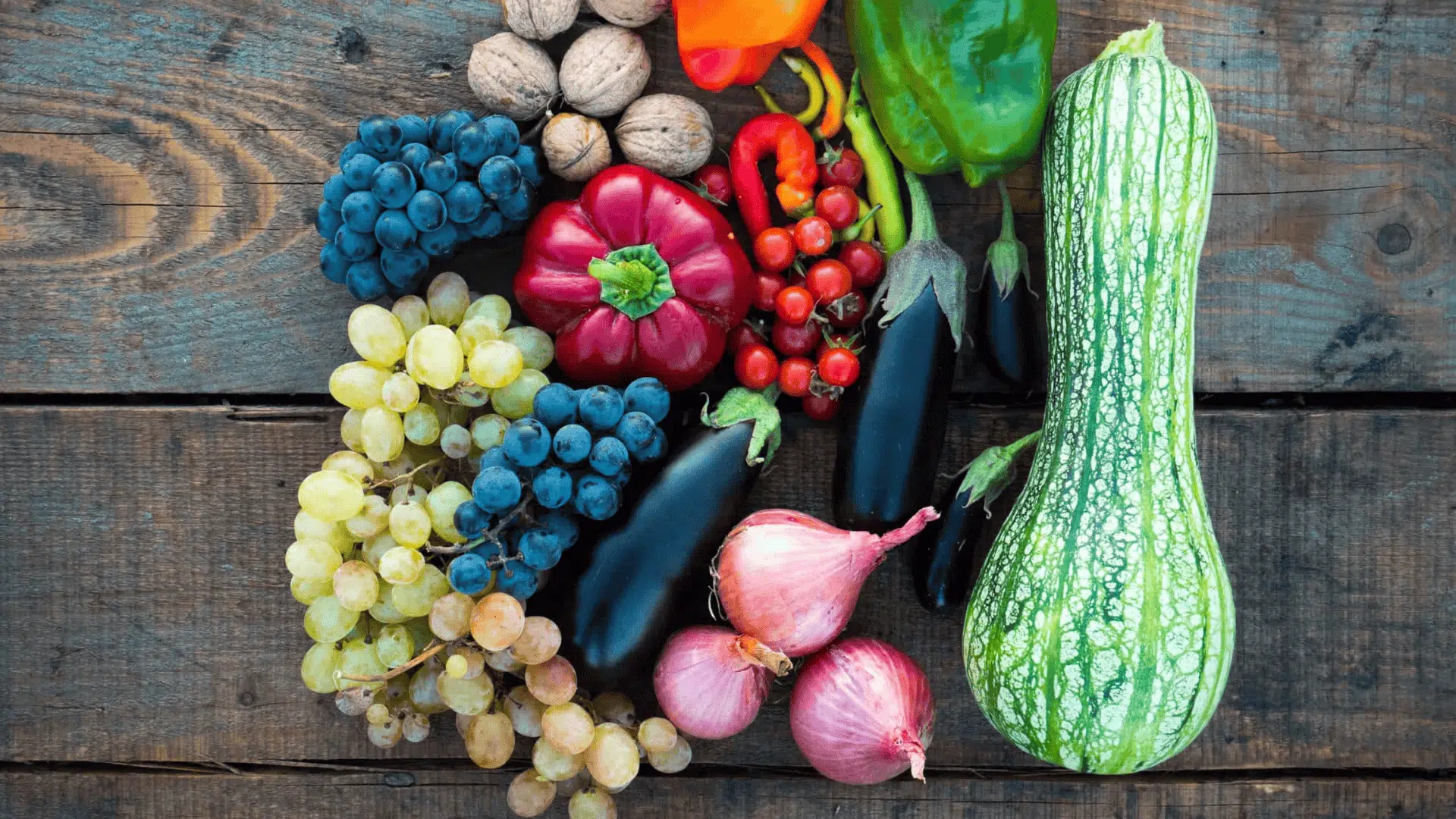
Some fruits offer key nutrients that support your kidneys and may help manage creatinine levels. Here are the top choices to consider.
1. Apples
Apples are one of the best fruit choices for kidney health. They contain high amounts of fibre and are naturally low in potassium.
The fibre in apples helps reduce inflammation throughout your body. This anti-inflammatory effect may benefit your kidneys over time.
You can eat apples fresh, baked, or as unsweetened applesauce. Try to eat the skin when possible, as it contains many beneficial compounds.
2. Blueberries & Cranberries
Blueberries and cranberries pack powerful antioxidants called polyphenols. These compounds help protect your kidney tissue from oxidative stress.
Research shows that berries may help reduce inflammation in the kidneys. They also support healthy blood flow to these vital organs.
Fresh or frozen berries work well in smoothies, oatmeal, or eaten as snacks. Avoid berry products with added sugar or artificial sweeteners.
3. Strawberries & Cherries
Strawberries and cherries contain compounds that help reduce inflammation throughout your body. This benefit extends to your kidneys as well.
Both fruits provide vitamin C, which supports immune function and tissue repair. This vitamin may help your kidneys recover from mild damage.
Choose fresh varieties when possible. Frozen options without added sugar are also good choices for smoothies and cooking.
4. Watermelon
Watermelon has very high water content, making it great for hydration. Staying well-hydrated helps your kidneys filter waste more effectively.
This fruit is also relatively low in potassium compared to many other fruits. This makes it a safer choice for people with kidney concerns.
Eat watermelon fresh as a snack or add it to fruit salads. The natural sweetness makes it a satisfying treat.
5. Pineapple & Kiwi
Pineapple contains enzymes that may help with digestion and reduce inflammation. These effects could indirectly benefit kidney health.
Kiwi fruit provides vitamin C and fibre while being moderate in potassium. Both fruits are refreshing and easy to digest.
Add fresh pineapple or kiwi to fruit salads or eat them as healthy snacks. Avoid canned varieties packed in heavy syrup.
6. Grapes (Especially Red)
Red grapes contain resveratrol, a compound that research links to kidney protection. This antioxidant may help prevent kidney damage.
Grapes are also hydrating and easy to digest. They make convenient snacks and add natural sweetness to meals.
Choose fresh grapes over grape juice, which is more concentrated in sugar. Wash grapes thoroughly before eating.
7. Peaches & Plums
Peaches and plums offer moderate potassium levels and good hydration benefits. They contain antioxidants that support overall kidney health.
These stone fruits provide natural sweetness without overwhelming your kidneys. They also supply fibre that aids healthy digestion.
Fresh peaches and plums work well as snacks or in fruit salads. Remove the pits and wash the skin thoroughly before eating.
8. Papaya
Papaya contains enzymes that support healthy digestion and reduce inflammation. This tropical fruit is also rich in vitamin C and antioxidants.
The high water content in papaya helps maintain good hydration levels. It provides natural sweetness while being gentle on kidney function.
Choose a ripe papaya that feels slightly soft to the touch. Remove the seeds and skin before eating the orange flesh.
9. Pears
Pears are naturally low in potassium and high in fibre. They provide gentle nutrition that supports kidney health without adding stress.
The fibre in pears helps regulate digestion and may reduce inflammation. This fruit also contains antioxidants that protect kidney tissue.
Eat pears fresh with the skin on for maximum fibre benefits. They also work well baked or added to fruit combinations.
10. Raspberries & Blackberries
Raspberries and blackberries contain powerful antioxidants similar to other berries. They help protect kidney cells from oxidative damage.
These berries are lower in natural sugars compared to many other fruits. They provide excellent nutrition without spiking blood sugar levels.
Fresh or frozen berries work equally well for kidney health. Add them to smoothies, oatmeal, or eat them as healthy snacks.
11. Cantaloupe & Honeydew Melon
Cantaloupe and honeydew melons have high water content that supports kidney function. They help maintain hydration while providing natural sweetness.
These melons are moderate in potassium and gentle on kidney function. They also contain vitamin C and other beneficial nutrients.
Choose ripe melons that feel heavy for their size. Cut them fresh and store leftover pieces in the refrigerator.
12. Lemon & Lime
Lemons and limes add flavour to foods and drinks without harmful additives. The citric acid they contain may help prevent certain types of kidney stones.
These citrus fruits are very low in potassium and calories. They make excellent additions to water for natural flavour enhancement.
Use fresh lemon or lime juice rather than bottled versions. Add slices to water or squeeze juice over other kidney-friendly foods.
Fruits and Potassium – What to Know for Kidney Health?
| Category | Examples | Key Concern |
|---|---|---|
| High-Potassium Fruits | Bananas, oranges, avocados | Too much potassium can be harmful if the kidneys can’t remove it effectively. |
| Dried Fruits | Raisins, dates, prunes, apricots | Higher potassium concentration than fresh fruit; should be limited. |
| Fruit Juices with Sugar | Sweetened orange juice, fruit punch | Added sugar strains the kidneys, and juices lack the fibre benefits of whole fruits. |
| General Medical Advice | As advised by a doctor | It may be recommended to limit high-potassium foods based on individual kidney function. |
Always check with your healthcare provider about which fruits are safe for your specific condition.
How to Include These Fruits in Your Diet
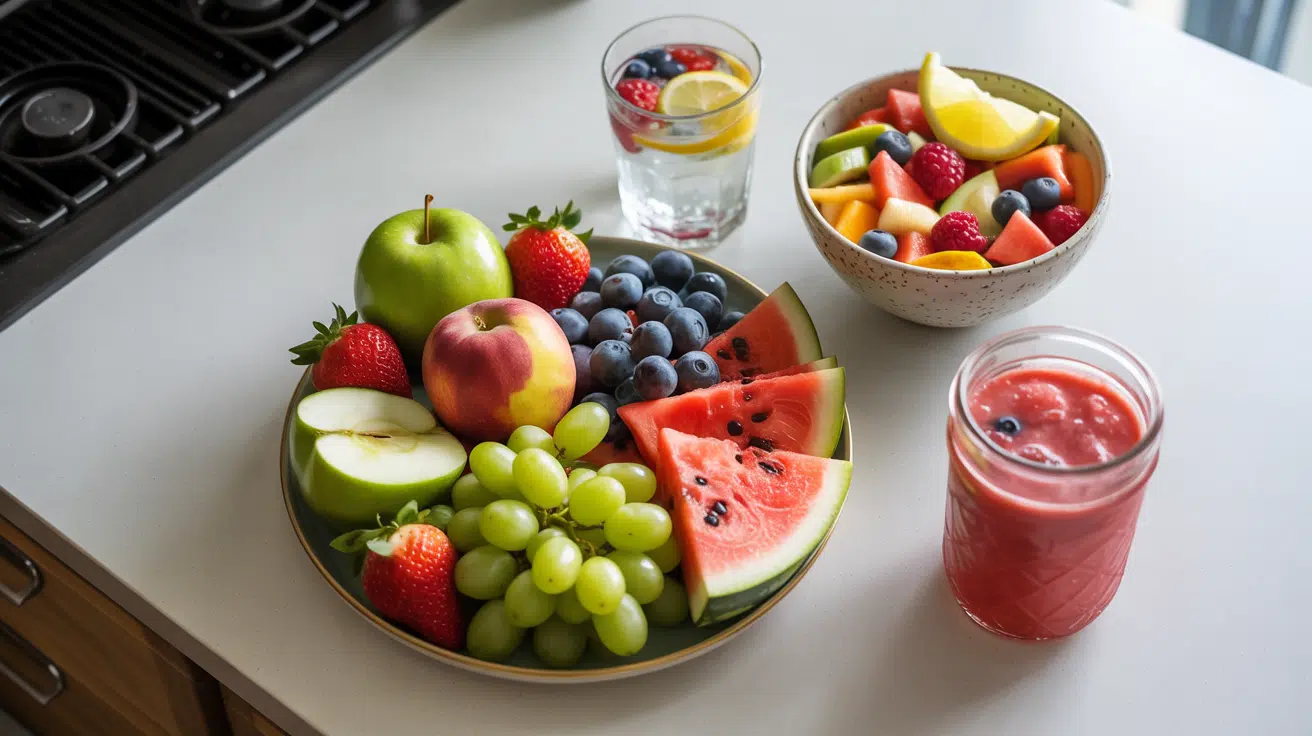
Enjoy these fruits in small portions throughout the day to support kidney health and balance your diet.
Serving Sizes and Frequency
- Most people with kidney concerns can safely eat 1 to 2 servings of fruit per day.
- One serving equals about ½ cup of fresh fruit.
- Eat fruit with meals, not on an empty stomach. This helps slow sugar absorption and reduces strain on your kidneys.
- Spread fruit intake throughout the day instead of eating large amounts at once. This helps maintain stable blood sugar levels.
Recipes and Meal Ideas
1. Fruit Salads
- Use apples, berries, and grapes
- Add a squeeze of lemon juice to prevent browning and boost flavour
2. Kidney-Friendly Smoothies
- Blend blueberries, strawberries, and a small amount of watermelon
- Use water or unsweetened almond milk as the base
3. Fruit-Infused Water
- Add slices of apple, strawberry, or watermelon to plain water
- Let it sit for 30 minutes for a naturally flavoured hydration option
Which Food Can Help You Reduce Creatinine Levels
Supporting kidney health through diet can help manage creatinine levels over time. Focus on foods that are low in potassium and rich in antioxidants and anti-inflammatory compounds.
| Food | Why It’s Helpful |
|---|---|
| Cabbage | Low in potassium and rich in fibre, it supports detox and kidney function |
| Cauliflower | Helps eliminate toxins; low in potassium and phosphorus |
| Garlic | Natural anti-inflammatory; adds flavour without extra sodium |
Be sure to check with your healthcare provider before making dietary changes.
Additional Natural Ways to Support Lower Creatinine
- Stay hydrated: Drink 8–10 glasses of water daily to help your kidneys filter waste more effectively (unless otherwise advised by your doctor).
- Limit protein intake: Reduce red meat and high-protein foods to ease the workload on your kidneys.
- Exercise gently: Light activities like walking can support blood flow and kidney health. Always check with your doctor before starting new exercises.
- Be cautious with supplements: Some herbs claim to help the kidneys but may interfere with medications or worsen kidney issues. Use only under medical supervision.
Real Stories: How Small Changes Made a Difference
You’re not alone in looking for natural ways to support your kidney health.
Many people share their experiences on patient forums like Mayo Clinic Connect, and some have found that simple dietary adjustments made a noticeable difference.
Members have shared experiences of adding kidney-friendly fruits and vegetables to meals, increasing water intake, and cutting processed foods after elevated creatinine diagnoses.
Over weeks and months, combined with medical guidance, many reported feeling better and seeing improvements in follow-up tests.
These stories remind us that while fruits alone aren’t a cure, they can support kidney health alongside proper medical care.
When to See a Doctor?
Contact your healthcare provider if you experience swelling in your legs, ankles, or face. These symptoms may indicate worsening kidney function.
Persistent fatigue, nausea, or changes in urination patterns also warrant medical attention. These signs could mean your kidneys need immediate care.
Regular blood tests help monitor your creatinine levels and overall kidney function. Follow your doctor’s recommendations for testing frequency.
If dietary changes do not improve your creatinine levels after several weeks, you may need additional medical treatment.
Wrapping Up
If you’re looking for simple ways to care for your kidneys, adding the right fruits is a great place to start.
In this post, I shared a few smart choices, apples, berries, grapes, and watermelon, from the list of fruits to reduce creatinine levels.
They offer hydration, fibre, and antioxidants your body can benefit from every day.
You don’t need to change everything at once. If you’re swapping out one snack or drinking more water, that’s a solid step. And if you’re ever unsure, your doctor or dietitian can help you figure out what’s right for you.
Want more ideas? Take a look at my other blog posts for help with meals, habits, and everyday choices.
Frequently Asked Questions
Can Eating Fruits Alone Lower My Creatinine Levels?
No, fruits cannot directly lower creatinine on their own. However, they support kidney health through hydration, antioxidants, and anti-inflammatory compounds.
How Much Fruit is Safe to Eat if I Have High Creatinine?
Most people with kidney concerns can safely eat 1 to 2 servings of fruit per day (about ½ cup per serving). Choose low-potassium options like apples, berries, and grapes, and consult your healthcare provider for personalized advice.
Should I Avoid All High-Potassium Fruits Completely?
Not necessarily; it depends on your individual kidney function and potassium levels. Your doctor may allow small amounts of higher-potassium fruits if your levels are stable.




